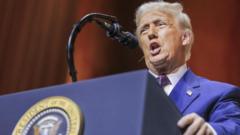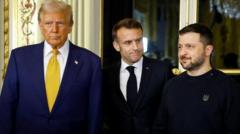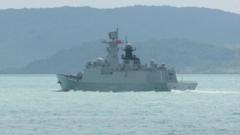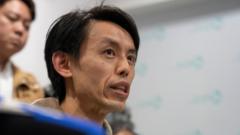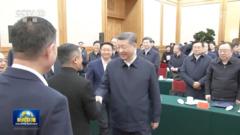Xi Jinping seems to see an opportunity as Trump’s tariffs sow uncertainty and division in the US, with China steadily positioning itself as a stable alternative in global trade.**
Xi Jinping's Strategic Silence Amidst Trump's Tariff Turbulence**
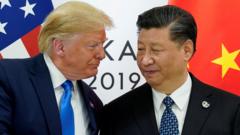
Xi Jinping's Strategic Silence Amidst Trump's Tariff Turbulence**
How China's muted response to new US tariffs highlights its evolving global trade strategy in light of US domestic division.**
In an era marked by tumultuous trade relations, the recent announcement of a new 10% tariff on all Chinese goods by US President Donald Trump has elicited a notably restrained reaction from Beijing. This contrasts sharply with the vociferous retaliations expected from Canada and Mexico, whose leaders have already signaled their intent to impose respective tariffs on American products. While Canadian Prime Minister Justin Trudeau has taken a hardline stance, emphasizing that Canada "will not back down," China's response has been deliberately subdued.
This strategic restraint can be attributed to a multitude of factors. When Trump first began his tariff imposition in 2018, China responded with overt aggression, but it has since recalibrated its approach. Now, instead of enacting immediate retaliatory measures, Beijing advocates for dialogue, encouraging the US to "meet China halfway." Although the new tariffs on Chinese imports will add to an already burdensome trade landscape, China's leadership appears confident in its ability to withstand this pressure. Experts suggest that the 10% tariff is manageable for China, particularly given its diversified trade relations established in regions such as Africa, South America, and Southeast Asia—where it holds the title of the largest trading partner for more than 120 countries.
This perspective might provide Xi Jinping with a dual advantage: on one hand, he refrains from escalating tensions, maintaining a posture of calm and stability, while on the other he can reposition China as a reliable trade partner amidst burgeoning uncertainty in the US. With Trump's evident "America-first" attitude potentially undermining US leadership and credibility worldwide, China finds itself in a favorable position to step into the void, aiming to present itself as a stabilizing force in global trade.
John Delury, a historian of modern China, emphasizes the implications of Trump's policies, stating that they risk conveying a disinterest in international partnerships—something that Xi can leverage. As Trump's unilateral moves continue to alienate traditional allies, the prospect for China to foster new alliances grows markedly. The apprehension felt by US allies in the Pacific, including Japan and Australia, might catalyze a more profound regional alliance network, independently of US influence.
Now more than ever, the international community is observing how these dynamics might reshape the global order. The current geopolitical climate has introduced complexities, including rising tensions in the South China Sea and the sensitive issue of Taiwan—a constant point of contention in US-China relations. Concerns about potential military conflicts amplify the urgency for countries in the region to balance their economic interests with national security, potentially positioning them closer to China as a counterbalance to an unpredictable US.
As families in China usher in the New Year amidst festive traditions, they are also conscious of the economic challenges ahead, following years of trade skirmishes. The Chinese commerce ministry has indicated plans to resort to the World Trade Organization for resolving trade grievances. However, with recent years seeing the WTO's capabilities hampered due to US actions, the effectiveness of such measures remains uncertain.
In conclusion, while Trump's administration poses significant challenges, China's silence may well be a calculated play, allowing it to navigate the complexities of its relationship with the US while strategically enhancing its global trade posture. As Washington’s intentions remain murky, Xi Jinping appears poised to build a narrative of stability that could sway international opinion in China’s favor.


